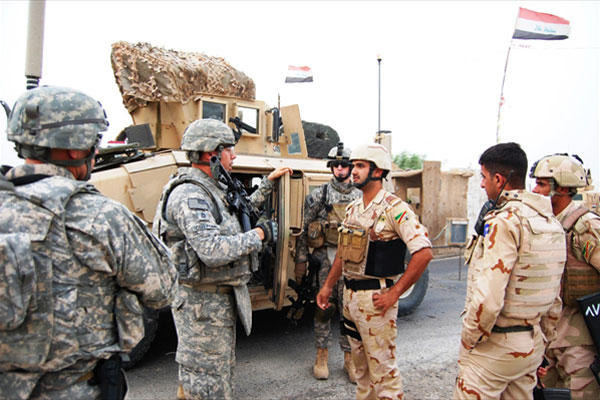The Army announced Wednesday several upcoming unit rotations involving a total of 3,000 troops in August and September, mostly from the frequently deployed 10th Mountain Division, to Iraq, Afghanistan and Kuwait to keep troop levels at current strength in the region.
"These are routine rotations to replace personnel that are already there," said Navy Capt. Jeff Davis, a Pentagon spokesman. The U.S. currently has about 3,550 troops deployed for Operation Inherent Resolve in Iraq and about 9,500 for Operation Freedom Sentinel in Afghanistan.
The Army said that 1,250 soldiers from the 1st Brigade Combat Team, 10th Mountain Division, based at Fort Drum, N.Y., will rotate to Iraq. The deployment to Iraq of the 1st BCT, which last deployed to Afghanistan in 2013, was expected to last nine months.
An additional 300 10th Mountain troops from Fort Drum will join another 1,000 troops from the 3rd Brigade Combat Team of the 10th Mountain based at Fort Polk, La., to deploy to Afghanistan, the Army said.
Troops from the 3rd BCT returned from an Afghanistan deployment in March 2014. The unit was then known as the 4th BCT out of Fort Drum but became the 3rd BCT after being posted to Fort Polk.
"We continuously train in preparation for contingencies around the globe, which is why I am confident that our soldiers are equipped, trained and ready to assume the missions announced," Maj. Gen. Jeffrey Bannister, commander of the 10th Mountain and Fort Drum, said in a statement.
The Army also said that 450 soldiers from III Corps, based at Fort Hood, Tex., will be going to Kuwait in September for a 12-month rotation in the headquarters of Combined Joint Task Force-Operation Inherent Resolve, which has been "leading the regional campaign of coalition and international partners" against ISIS in Iraq and Syria.
Lt. Gen. Sean MacFarland, commander of III Corps and Fort Hood, said that "III Corps has a proud history of answering the nation's call when it has come. We are trained and ready to perform our mission."
The Obama administration has said repeatedly that there are no immediate plans to boost the number of troops on the train and advise mission in Iraq beyond the current strength of 3,550, although Joint Chiefs Chairman Gen. Martin Dempsey has said in Senate testimony that more troops would be needed for force protection if the administration decided to deploy Joint Terminal Attack Controllers (JTACs) to guide airstrikes.
President Obama's current plan is to draw down the current level of 9,500 troops in Afghanistan to what would essentially be an embassy presence by the end of 2016 but he has been coming under pressure from the Afghan government and Republicans in Congress to extend the stay.
Army Gen. John Campbell, the U.S. commander in Afghanistan, said at a Brookings Institute forum on Tuesday that he would be making a recommendation to the administration in the fall on troop levels.
-- Richard Sisk can be reached at richard.sisk@military.com






























